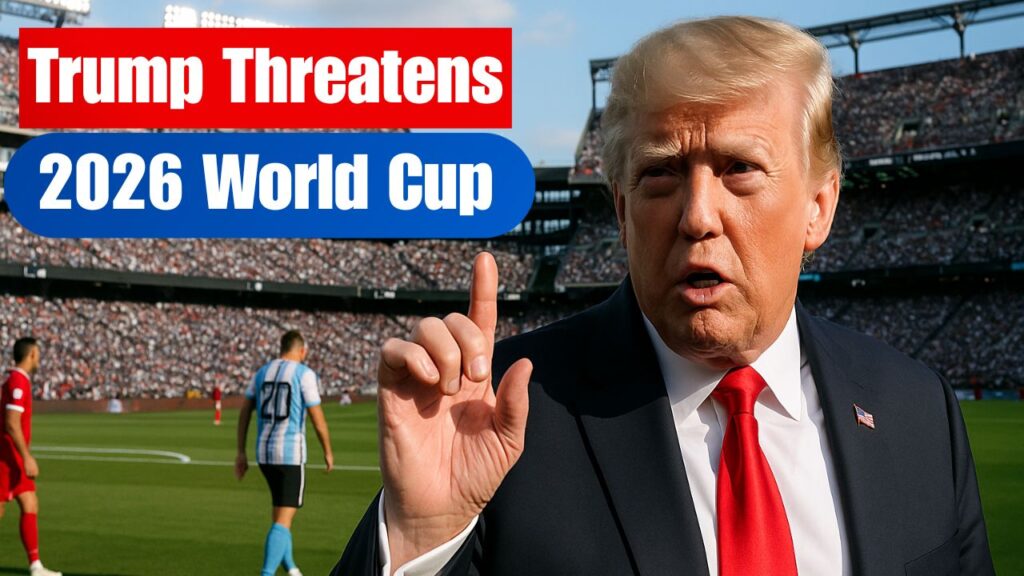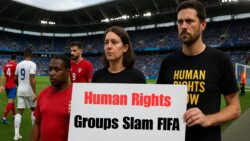The tension between politics and sports reached a new peak this week as former U.S. President Donald Trump made headlines by threatening to pull the 2026 World Cup games from Boston. His statement came after disagreements with local officials over funding and security arrangements. While Trump’s remarks immediately stirred controversy, the FIFA response caught everyone off guard — taking a diplomatic yet firm stance that emphasized unity, cooperation, and the importance of keeping politics out of football. The situation has ignited debate across the United States about the balance between politics, sports, and international partnerships.

Trump’s Bold Threat Over Boston World Cup Games
During a recent event in Florida, Donald Trump claimed that unless local and state authorities “get their act together,” he would work to have World Cup 2026 matches moved from Boston to another U.S. city. His statement came amid ongoing disputes between organizers and local officials regarding stadium upgrades and public spending. Trump criticized Massachusetts’ political leadership for “poor planning,” suggesting that other cities such as Miami or Dallas could be better hosts. His remarks quickly went viral, fueling discussions about whether political influence should play a role in major sporting decisions.
FIFA’s Unexpected Reaction to Trump’s Comments
Within hours of Trump’s comments, FIFA officials issued a carefully worded statement that surprised many. Instead of engaging in a political back-and-forth, the organization reiterated its commitment to maintaining Boston as a key host city for the 2026 World Cup. FIFA highlighted the city’s “historic sporting culture” and “unmatched fan enthusiasm.” The statement emphasized collaboration with both national and local governments to ensure smooth execution of the games. This calm, professional reaction has been praised by analysts as a sign that FIFA leadership is determined to keep the tournament free from political distractions.
Reactions from Boston and Sports Fans Across the U.S.
The reaction in Boston was swift and unified, with city officials and residents expressing strong support for keeping the World Cup matches in their city. Mayor Michelle Wu called Trump’s statement “politically motivated noise,” while local businesses highlighted the potential economic boost of hosting the global event. Across social media, fans from other states debated the controversy — some applauding Trump’s stance on accountability, others condemning the attempt to politicize the football tournament. Experts believe the controversy could actually boost excitement and publicity for the 2026 event.
Impact on U.S. Hosting Plans and Global Perception
Although FIFA’s response quelled immediate fears, the Trump controversy raised broader concerns about how political involvement might affect future sporting events in the U.S. With 16 host cities across North America preparing for the World Cup 2026, cooperation between governments and organizers is crucial. Analysts note that any perception of instability could harm the global image of U.S. sports diplomacy. However, many believe this dispute will ultimately pass, leaving behind a stronger framework for managing political tensions in international sports events.
| Aspect | Details |
|---|---|
| Event | Trump’s threat to remove Boston as a 2026 World Cup host city |
| Location | Boston, Massachusetts, United States |
| Main Authority | FIFA (Fédération Internationale de Football Association) |
| FIFA Response | Affirmed Boston’s host status; urged unity and cooperation |
| Public Reaction | Mixed — strong support in Boston, political debate nationwide |
FAQ 1: Why did Trump threaten to pull the games?
He cited disagreements with Boston officials over funding and infrastructure readiness.
FAQ 2: How did FIFA respond to Trump’s statement?
FIFA reaffirmed Boston’s role and emphasized unity over political interference.
FAQ 3: Will Boston still host the 2026 World Cup?
Yes, FIFA confirmed Boston remains a key host city for the event.
FAQ 4: How did fans react across the U.S.?
Opinions were divided — some supported Trump’s criticism, others defended FIFA’s neutrality.




